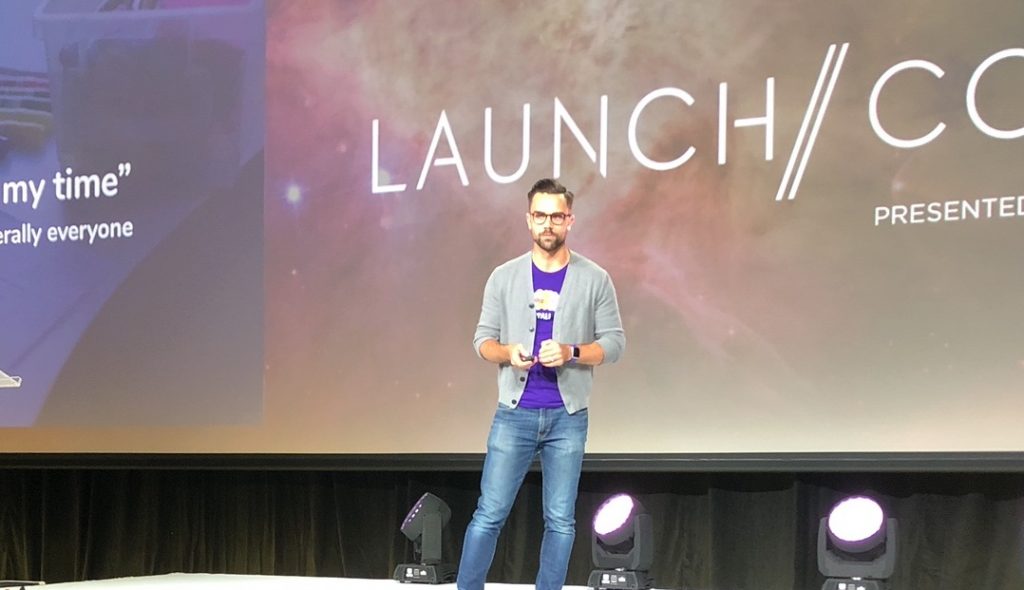Tali, the voice-driven time tracking app with the cutest mascot in legal tech  took home the big Launch//Code $100,000 prize at the 2018 Clio Cloud Conference. We caught up with Matt Volm, one of the “Three Matts” who makes up Tali’s leadership team, to learn more about Tali’s journey from concept to execution and his take on the future of voice technology in legal.
took home the big Launch//Code $100,000 prize at the 2018 Clio Cloud Conference. We caught up with Matt Volm, one of the “Three Matts” who makes up Tali’s leadership team, to learn more about Tali’s journey from concept to execution and his take on the future of voice technology in legal.
ETL: Tell us a little about Tali.
MV: Powered by conversational technology like Amazon Alexa, Tali is a timekeeping assistant for lawyers that will track and enter their time for them. With Tali, you can log and track your time using your voice and sync your data directly to your invoicing or billing system (we currently integrate with Clio, Rocket Matter and Practice Panther), completely eliminating the chore of manual time entry…with Tali, you’ll never have to fill out another time entry form again!

Matt Volm pitches for the prize at Clio Cloud.
ETL: How did you come up with the concept for Tali?
MV: For Tali, it all began late one night in early 2017. My wife, a civil litigator here in Portland, was sitting at our kitchen table, pile of post-it notes next to her and her laptop open. On her post-it notes was her billable time for the week, and she was taking that information and manually entering everything into her billing system. It was an incredibly painful and tedious process, one that took her hours to do. At the same time, I was in our kitchen putting something in the oven and setting a time with our newly purchased Amazon Echo device. After doing so, I randomly shouted into the dining room to my wife “Hey, wouldn’t it be great if Alexa could just log your billable time for you so you never had to fill out a time entry form?” From there, Tali was born…
ETL: Investors are typically looking for a demonstrable minimum viable product and some revenue traction prior to investing. How did you go from concept to seed funding in 90 days?
MV: Initially we spoke to as many attorneys as we possibly could to validate our idea; then we built a prototype and shot a demo video on our iPhone; from there, we started to share the video and story with early stage investors (e.g. me sending cold e-mails to VCs I had never met asking for meetings to discuss my idea) and within 3 months received our first investment.
I think this happened for two reasons – the first was luck, just right place and right time, the second was story/vision…we didn’t have anything yet from a product standpoint, but we had a compelling vision about why voice technology would fundamentally change the way we do business
ETL: Conventional wisdom says lawyers are risk averse. What, if any, hurdles have you had in getting buy-in to the concept from investors and from lawyers? How did you assuage concerns?
MV: We have taken a partnership approach from day one, which has helped us address the risk averse nature of our customers. The first involves our technology partners – we integrate with tools like Clio, Rocket Matter and Practice Panther…leaders in cloud based practice management. Secondly, we’ve also partnered with bar associations early on to make sure they felt confident in our technology…today we are member benefit partners of the Ohio State Bar Association, the Florida Bar, and the San Francisco Bar.
ETL: What advice do you have for other legal tech entrepreneurs?
MV: Focus on the problem, not the solution…if you’re focused on solving a real problem for lawyers and legal professionals, rather than building a solution for them, you’ll be successful
Here’s what I mean – with Tali, we didn’t say to ourselves “Alexa is cool, we should figure out how to bring that type of voice technology into the legal industry”; instead, we started with the problem of “lawyers hate tracking their time, how can we make that go away?”
Second thing is this – quickly making the wrong decision is better than making no decision at all; as an entrepreneur you need to be ready to make a lot of choices quickly and be okay with the fact that you will make the wrong decision…good news is that you can make a wrong decision, and one of your future decisions can be to correct that prior wrong decision
ETL: Beyond billing and time keeping, what other voice enabled applications do you see taking off in the legal space?
MV: Next, I think voice technology will start to appear throughout the offices of law firms…on peoples’ desks and in conference rooms.
I also think we will start to see voice go to other, more complex areas of an attorneys workflow; for example, one particular place could be legal research…rather than sitting down and using your keyboard to perform legal research, you’ll be able to quickly get the information you need by asking your voice assistant – imagine if you could just ask Alexa “when is secondary liability established in copyright infringement cases?”
Lastly, I think voice technology will make its way to client facing assistance. In May, Google demoed how their voice assistant was able to call a salon, talk to a real person, and get a haircut booked for their human client…imagine if a voice assistant could handle part of your client intake process?
ETL: What’s next for Tali?
MV: With Tali, we are looking to add other conversational technology to the product, including text messaging and e-mail capabilities, giving folks more ways to capture their time…in addition, we are evaluating other areas of an attorneys workflow where voice and conversational technology could be valuable.
Can’t get enough of the Tali story, check out Matt’s Evolve the Law podcast with Ian Connett.
 Deb Tesser is Director of Special Projects at Above the Law, and the point person for Evolve the Law, ATL’s Legal Innovation Center. Follow Deb on Twitter (@Deb_Tesser).
Deb Tesser is Director of Special Projects at Above the Law, and the point person for Evolve the Law, ATL’s Legal Innovation Center. Follow Deb on Twitter (@Deb_Tesser).






